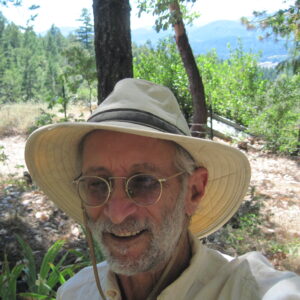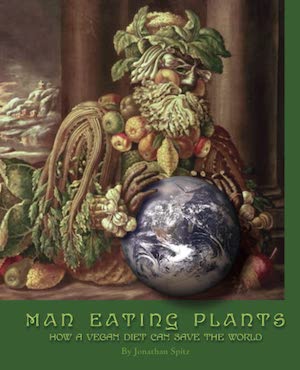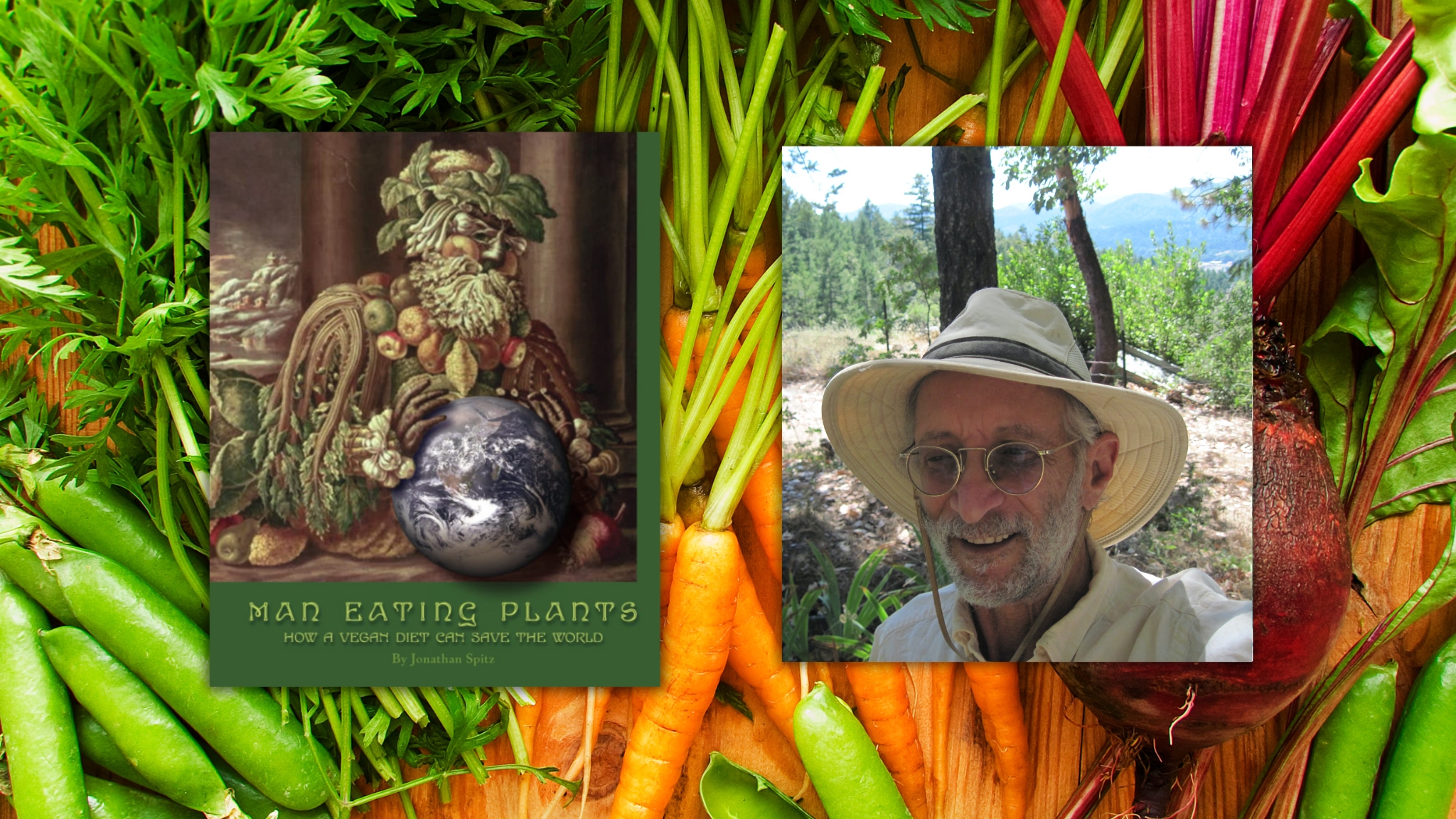Man Eating Plants by Jonathan Spitz
Rising temperatures, rising sea levels and rising extinction rates. To say that our planet is in trouble would be a massive understatement. But what can we, as individuals, do to stop such large-scale destruction?
According to environmental and animal rights activist Jonathan Spitz, veganism is the change we all can make to help the planet. Inspired by the book that kicked off his own journey into plant-based dieting, Spitz’s book Man Eating Plants (6th Sense Press) lays out how a switch to veganism can help offset the pollution of meat and livestock production.
Read our interview below to check out more of what Spitz has to say about our species’ past, present and hopeful future with veganism.
Q: What set you on your path to veganism? Was there a particular catalyst that made you switch to a plant-based diet?
A: Yes, in 1990 when I was 37, my wife Toni suggested that I read the book Diet for a New America by John Robbins. At the time, I was eating a typical American diet loaded with meat, dairy and eggs, and I didn’t really want to read a book about a plant-based diet. But on my wife’s urging, I finally read it and it changed my life forever. Robbins beautifully describes how a plant-based diet not only is healthy and sustainable, but also spares food animals from lives of suffering and torment. After reading DNA, I went vegan in a month.
Q: In Man Eating Plants, you talk about humans’ evolution from obscure herbivorous species to the world’s most populous carnivorous apex predator species. Could you expand on this and what it means for modern humans’ relationship with food?
A: By changing from our natural herbivorous diet to an unnatural carnivorous diet, humans have gone from the bottom of the food chain to the top. In a natural ecosystem, the animal biomass of herbivorous species normally massively outweighs the animal biomass of carnivorous apex predator species. But now, with humans as the most populous large mammal species on Earth as well as the top apex predator species, raising the amount of livestock necessary to supply billions of naturally herbivorous humans with an animal rich diet is severely stressing the life support systems of our planet.
Q: While our species has certainly made great strides since adopting a more carnivorous diet, you also point out an increase in chronic degenerative disease, catastrophic climate change and mass species extinction. How do these relate back to meat consumption?
A: When modern humans (Homo sapiens) migrated out of tropical Africa into the more temperate climates of Eurasia starting around 60,000 years ago, hunting and eating animals was essential for their survival. But today, since humans typically live well beyond 50 years of age, a steady diet of meat, dairy and eggs high in saturated fat, cholesterol and animal protein and low in fiber, is the leading cause of chronic degenerative diseases such as atherosclerosis, diabetes and cancers. Since livestock production is also the leading cause of runaway climate change and mass species extinction, it has now become imperative for our survival that we return to our natural plant-based diet.
Q: There’s no doubt that your work as an environmental and animal activist has had an impact on Man Eating Plants. Is there a specific example of a way your field of work has influenced your writing?
A: As an environmental and animal activist, I think about the world in ecological terms. In a natural ecosystem, every animal has a food niche that it evolved to fill. Humans are primates and we evolved to thrive on fruits, vegetables, tubers, nuts and seeds. When we began to include animal foods in our diet, it changed our relationship with all our fellow animals from relatively benign to adversarial. The realization that we humans are now subjugating billions of animals to produce food that our bodies are not evolutionarily adapted to eat has had the most profound influence on my writing.
Q: How would you encourage the everyday reader to do their part in finding a better balance between humanity and nature?
A: It will come as no surprise that in order to find a better balance between humanity and nature I would encourage everyone to transition to a natural, healthy, whole-food, plant-based, diet. Dietary change is the one action we can each take right now in our own lives that will protect us against chronic degenerative disease while at the same time help to mitigate global warming and mass species extinction. As arable land and fresh water resources diminish over the coming decades, a low impact plant-based diet is the only way we will be able to provide food security for our growing human population.
Q: What’s next for you?
A: Most ecologist today recognize that the Earth has entered the geological time period known as the “Anthropocene Epoch” in which human activity has started to have a significant impact on the planet’s climate and ecosystems. However, there is still robust debate about what human activity marked the beginning of the Anthropocene? In my next book project I will explore the hypothesis that it was the human exploitation of animals for food that marked the beginning of the Anthropocene, and now in the 21st century, feeding our animal food habit is still the most ecologically destructive human activity on Earth.
 Jonathan Spitz is an environmental and animal rights activist. In 1990, after reading Diet for a New America by John Robbins, he realized that humans lacked the anatomy or physiology of apex predators and our true role in a sustainable ecosystem is as a plant-eating species. With this new understanding of the human place on the food chain, at the age of thirty-seven he adopted a plant-based vegan diet and began defending the rights of all animals to live free from human exploitation.
Jonathan Spitz is an environmental and animal rights activist. In 1990, after reading Diet for a New America by John Robbins, he realized that humans lacked the anatomy or physiology of apex predators and our true role in a sustainable ecosystem is as a plant-eating species. With this new understanding of the human place on the food chain, at the age of thirty-seven he adopted a plant-based vegan diet and began defending the rights of all animals to live free from human exploitation.
Through the 1990s, he served on the Board of Directors of the Willits Environmental Center to thwart the relentless destructive forces of local economic development. In the 2000s and 2010s, he authored an op/ed column, Connecting the Dots, that focused on environmental and animal rights issues for his hometown newspaper, The Mendocino County Observer.
For thirty years, Jonathan kept abreast of the most current studies on the complex relationship between the human food niche and the Earth’s ecosystems. When he realized there were no books in the ecological canon telling the story of how humans evolved from an obscure herbivorous species to become the world’s most populous carnivorous apex predator species, and how this change in human diet has led to epidemics of chronic degenerative disease, runaway climate change and mass species extinction, he decided to write it himself.
Jonathan has lived in Mendocino County on California’s North Coast since the 1980s. He can be reached at: plantbased.js@gmail.com.






